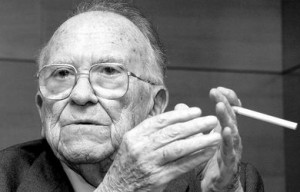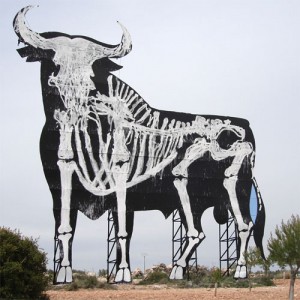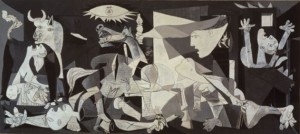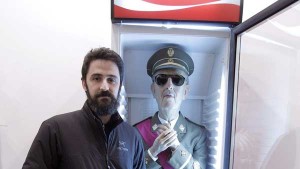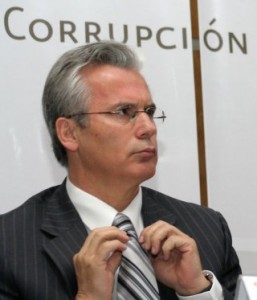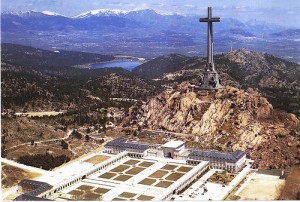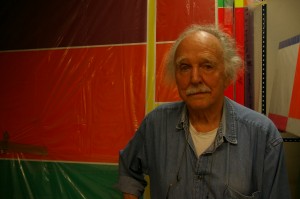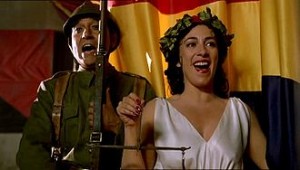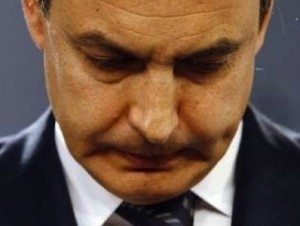Alfredo Landa, who died last week, was iconic in the world of Spanish cinema as a comic Everyman, lending his name to a style of popular comedy - landismo. Like Norman Wisdom in the UK or Jerry Lewis in the US, Landa played the common man, who, for all his follies and petty obsessions, remains true to himself (and the leading lady). He rebels against authority not because he is a rebel by nature but because only by rebelling can he retain integrity, and he gets the girl in the final reel. However Landa, like Wisdom or Lewis, also showed his talents as a serious dramatic actor. In 1984 he was chosen by Mario Camus to play the lead role of Los santos inocentes, a peasant farmer whose innate … [Read more...] about The tragic struggle of the loser on the Vespa
Franco
Santiago Carrillo: the nearly man
Santiago Carrillo, who has died at the age of 97, belonged to another time, or perhaps more accurately, and depending on one’s age, to a number of other times: the Civil War; the decades of exile during the Franco regime; the first years after the death of the dictator; but above all to a time when people still took Communism seriously. Despite his failure to secure a lasting place for the Spanish Communist Party (PCE) in Spanish political life, he managed to reinvent himself as one of the guardians of that most revered institution, the transition to democracy. While still in his teens, as a member of the Socialist Youth, Carrillo took part in the uprising in Asturias in 1934, and was … [Read more...] about Santiago Carrillo: the nearly man
Spain’s true crisis isn’t economic, it’s institutional
As Spain has moved closer to what looks increasingly like economic disaster, there have been a couple of surprising - even heartening - moves by the country’s senior politicians lately. One was the announcement made by Socialist leader Alfredo Pérez Rubalcaba that his party offered its full support to the conservative government going into the key European summit in Brussels on June 28. This rare instance of political unity was accompanied by an unusual show of stark public honesty by Prime Minister Mariano Rajoy. “We can’t finance ourselves at these levels of interest much longer,” said the man who had denied that Spain would request a bank bailout days before it did so, and who said he … [Read more...] about Spain’s true crisis isn’t economic, it’s institutional
Remember Gernika – but don’t forget Chaouen
The last few weeks have seen commemorations, mainly in the Basque Country, of the 75th anniversary of the bombing by German and Italian warplanes of the historic town of Gernika at the behest of General Francisco Franco during the Spanish Civil War. Around 4.30 in the afternoon of April 26, 1937, a joint squadron of 23 German and Italian planes appeared in the skies over the historic, and undefended, Basque town. Over the next five hours they dropped a total of 22 tons of high explosives and incendiary devices that burned for days, destroying 70 percent of the town, and killing and wounding at least 1,600 people, around a third of the population. Gernika remains a powerful symbol of … [Read more...] about Remember Gernika – but don’t forget Chaouen
Franco in a fridge: he pulls in the punters, but is he art?
More than 36 years after heading for the great military dictatorship in the sky, General Francisco Franco proved his enduring pulling power by stealing the show at last week’s annual ARCO contemporary art fair, appearing in a fridge and as a fast-spinning bust; even his eyebrows were a big draw. Siempre Franco (Forever Franco) was the star attraction at the five-day artfest, a life-size hyperrealist representation of the man who ruled Spain with an iron fist for four decades. The piece was created by Eugenio Merino out of resin, silicon, and human hair, and was decked out in Franco’s trademark green military uniform with purple sash, red cummerbund, and dark sunglasses, crouching inside a … [Read more...] about Franco in a fridge: he pulls in the punters, but is he art?
Garzón affair reflects Spain’s tortured relationship with its past
It’s another big week for Spain’s best-known judge. Today, Baltasar Garzón goes on trial to face charges of having knowingly overstepped his authority by ordering an investigation into the crimes of the Franco regime during and after the 1936-39 Civil War. Earlier this month, Garzón faced another trial, for having allowed police to wiretap conversations between defendants in the Gürtel corruption case and their lawyers. The verdict from that case is expected any day. Garzón is easily the most controversial figure in Spain’s judiciary and opinions on him are bitterly divided. The High Court magistrate, now suspended from his duties, dared go where none of his colleagues would. The … [Read more...] about Garzón affair reflects Spain’s tortured relationship with its past
Spain wrestles with Franco’s resting place
When friends or family come to Spain to visit and ask me to name the sites they should see in and around Madrid, they’re always surprised when I put a monument to fascism near the top of the list. But there’s no denying it, El Valle de los Caídos, or the Valley of the Fallen, the resting place of dictator Francisco Franco, is an awe-inspiring place. You can see it from miles away, a 150-meter-high stone cross – one of the world’s largest – rising up out of a rocky hillside north of the capital. Beneath the cross a huge esplanade gives a view over a strangely peaceful, wooded valley. Go on a clear day and the blue sky is a breathtaking backdrop to the scene. Go there in rain or sleet and … [Read more...] about Spain wrestles with Franco’s resting place
The man who knew Fidel Castro, Warhol and Franco’s Spain
It’s over half a century since the artist Waldo Díaz-Balart left Cuba. On January 1, 1959, he was seeing the New Year in at Havana’s Tropicana nightclub with the son of President Andrés Rivero Aguero, when he heard the news that the Revolution had triumphed. The 27-year-old Díaz-Balart knew he had to leave the island. His father, Rafael, had been a minister in the Batista government and had already left for the United States. His situation was also uncomfortable for social reasons: his sister, Myrta, had been married to a young man called Fidel Castro. They divorced in 1955. “On the one hand the Balart family had been in power and on the other, my sister had been married to Fidel … [Read more...] about The man who knew Fidel Castro, Warhol and Franco’s Spain
Spain’s Civil War film canon needs new urgency
It’s a terrible thing to have to say, but maybe the time has come for a moratorium on films about the Spanish Civil War. Last week saw the release of The Sleeping Voice (La voz dormida), an adaptation of Dulce Chacón’s novelised account of the vengeance exacted upon Republican women in the immediate aftermath of the Civil War by the Franco regime. In late 1939 in Ventas prison in Madrid, a group of women await the firing squad for having supported the Republican cause, or for having husbands, brothers and fathers who did. Among them are Hortensia, who fought with the militia and is pregnant by her husband Felipe – still at large – and who has been told she will be shot after she gives … [Read more...] about Spain’s Civil War film canon needs new urgency
How history will judge Zapatero
Jordi Sevilla, a former minister in the government of José Luis Rodríguez Zapatero, recalls how his then boss once told him about a massage he had enjoyed a few days after becoming prime minister. “The masseur was amazed at how little tension he had,” Sevilla said. “This guy had spent a week in La Moncloa (the prime minister’s residence) and that’s enough to leave anyone completely spent!” The anecdote, recounted to writer José García Abad, reflects a couple of popular, not entirely accurate, perceptions about Zapatero: that he is a detached, even cold politician, whose meteoric career has been driven purely by calculation; also that he is a featherweight who doesn’t understand the … [Read more...] about How history will judge Zapatero

